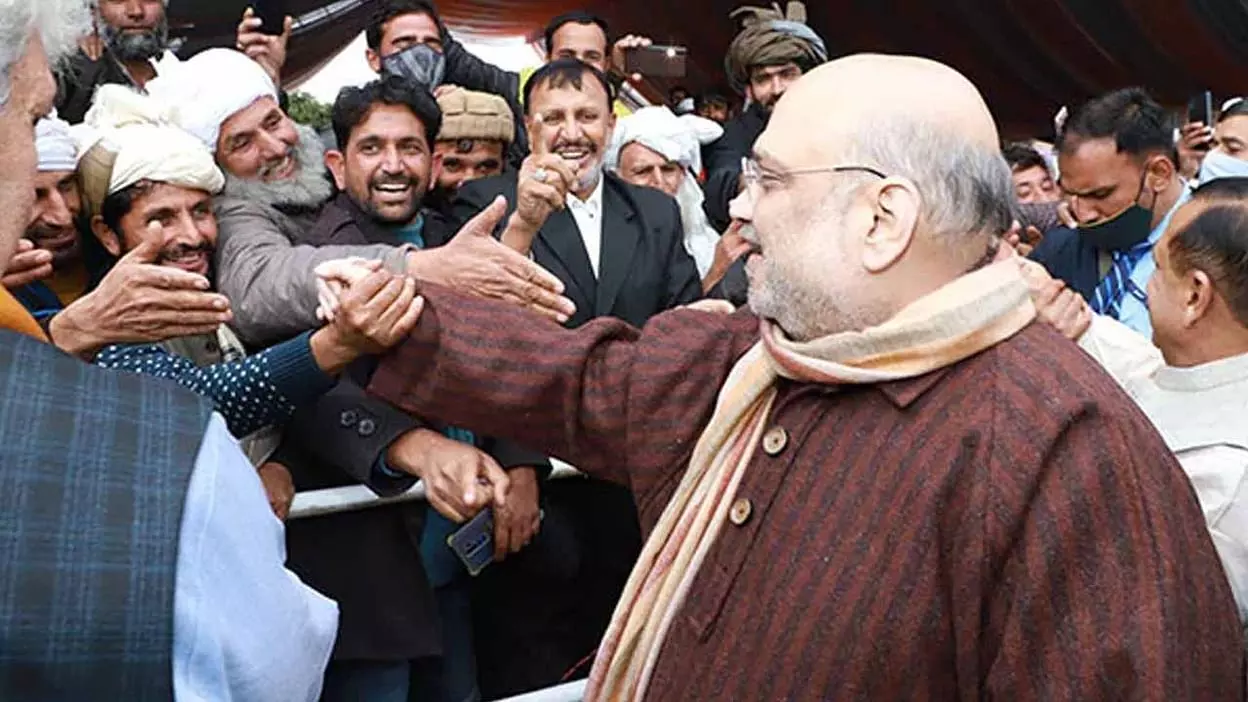
The BJP's unchanging Kashmir agenda
text_fieldsAmit Shah during his visit to Srinagar
Home Minister Amit Shah's first visit to the Valley since the abrogation of Jammu and Kashmir's special status, was watched with great curiosity by those inside and outside Kashmir. Promises in the name of states and union territories, project announcements, laying of foundation stones and inauguration ceremonies took place as usual. Amit Shah claimed that the Centre has so far invested Rs 12,000 crore in Jammu and Kashmir, promised to invest Rs 51,000 crore by the end of 2022 and said the Centre was looking at providing employment to five lakh youth in Jammu and Srinagar. A metro train was also announced for Jammu and Srinagar. The Home Minister maintained that everything was proper under the last two years of repressive rule. The point to remember is that these promises and speeches were made during a visit while 700 political workers were held in detention and cross-border terrorism was active again, and minorities and immigrant workers in Kashmir were falling victims to gunshots.
During Shah's visit, everyone was wondering what would be the next step by the Centre, which is constantly trying to bring Kashmir fully under its control. After the special status and rights conferred on the land by the Constitution for more than seven decades were taken away on August 5, 2019 and the state was bifurcated into the Union Territories of Jammu and Kashmir and Ladakh, the Centre placed it wholly under military rule. Even basic means of communication such as the telephone and the Internet were rendered paralyzed, political leaders have been jailed for months, and mass protests have been brutally suppressed with bullets. This is the "New Kashmir" the BJP is forging. They have also made it clear that the aim of the 'New Kashmir Reforms' is to dilute the demographic and cultural features of Kashmir and integrate it into the Indian mainstream. The repeal of Article 370 of the Constitution was intentionally done to forcibly mould to its cast any region with social, cultural and political context in the country that does not fall in line to the BJP's Hindutva politics.
A step-by-step plan was also prepared to bring Kashmir under the category of a state like any other. Along with Article 370, also abolished were certain special powers, including the control of land rights, which were created by the framers of the Constitution to keep the strategic border state close to the country. Thus, a plan was devised to settle outsiders in Kashmir using the newly opened opportunity. Attempts are also being made to end the dominance of regional parties that control politics in the Valley and to diversify the strength of the legislature to give more opportunities to the BJP and its supporters. As part of this, a constituency delimitation exercise was announced. The Prime Minister and the Home Minister had made it clear at the time when Jammu and Kashmir was divided into two that elections would be held soon to restore its statehood and legislative assembly. It was also announced that delimitation would be made as a prelude to that. The BJP has been patiently preparing the ground for the last two years to bring the 'New Kashmir' under the Centre's full control.
Following the partition of Ladakh, the strength of the Jammu and Kashmir Assembly was reduced from 87 to 83 seats. In this, seven seats will be increased to make it 90 and that is the mission of the Delimitation Commission headed by Supreme Court Judge Justice Ranjan Prakash Desai that was constituted on 6 March 2020. As of now, there are 46 seats in the Kashmir Valley and 37 in the Jammu region. Kashmir, which has a population ratio of 56.15 %, of the total, has a representation of 55.42 %. With a population of 43.84 %, Jammu has a representation of 44.52%. The average total population in the constituencies of Kashmir is 1,49,749. In Jammu, it is 1,45,365. Muslims constitute 68.6 % of the population, and have 66.66 % representations while Hindus number 28.44 %, with 31 % representation. In all the delimitations so far, the Jammu region has received the greatest consideration. It is in this context that political parties in Kashmir have accused the BJP of addressing non-Muslims or those who rely on that vote base to install in the Chief Minister's office in Srinagar. The non-BJP political parties in Kashmir are of the view that granting statehood should not in fact be linked to elections or delimitation. But Amit Shah has unequivocally declared that the order of priorities is first constituency delimitation, followed by elections and then statehood. The sum and substance of the three day visit of the Home Minister was the reaffirmation that there was no change in the Jammu and Kashmir agenda.






